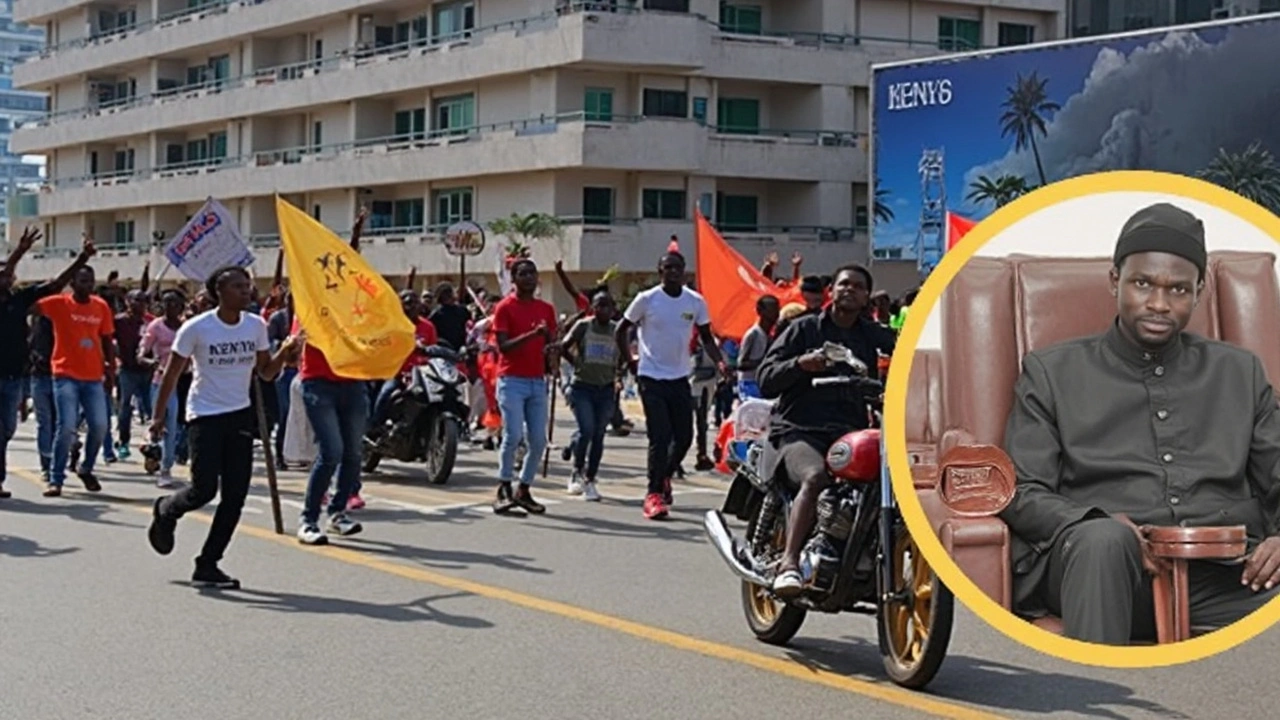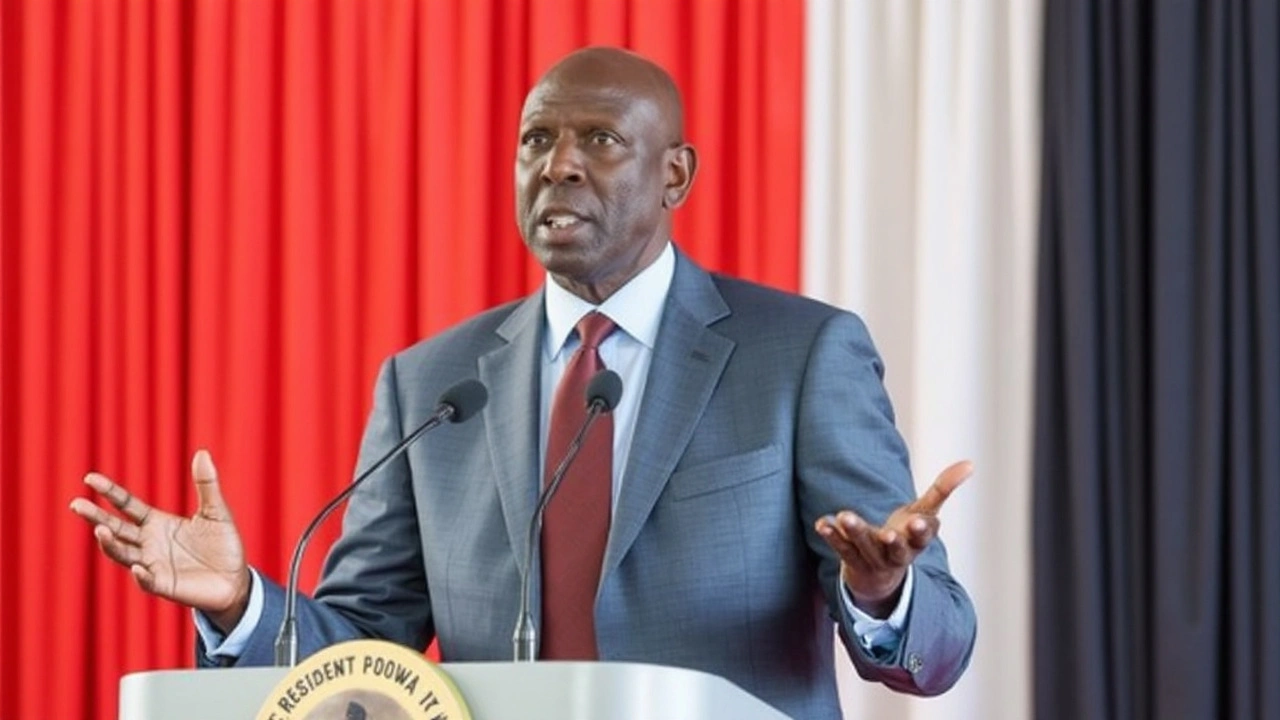President Ruto Appeals for Peace While Kenya Marks a Tragic Anniversary
The streets of Kenya are anything but quiet—especially as the nation remembers the first anniversary of the turbulent 2024 anti-Finance Bill protests. President William Ruto, at a funeral for Kilifi Governor Gideon Mung’aro’s father on June 25, 2025, took a stand. He strongly defended every Kenyan's right to protest but drew a bold line against violence, warning against ‘hooliganism, looting, and destruction of property.’ Ruto stressed that while protest is woven into the nation’s constitution, turning that liberty into chaos defeats its real purpose and puts national unity at risk.
The message wasn’t only for those gathered at the funeral—it was broadcast countrywide as demonstrations erupted in 27 counties. The faces and energy behind the protests? Kenya’s Gen Z. With their ever-present phones, flags, and chants of ‘Ruto must go,’ these young activists are demanding more than just lower taxes. They want a government that listens, more jobs, and reforms that go deeper than empty promises. Many waved flags while they called out the names of those lost during the crackdown last year—a crackdown that left a heartbreaking mark, with 60 lives lost. This year, at least 16 have already died and more than 400 have been hurt, most from police bullets.

Security Response Sparks Global Attention—and Criticism
As the crowds swelled across Nairobi and other cities, Kenya’s security forces didn’t just show up—they cracked down. Teargas clouds became a familiar sight, and countless protesters reported internet restrictions and TV blackout orders. If you tried to watch the chaos unfold live, you would have found nothing but static for hours. A court eventually overturned the government’s live broadcast ban, but the damage to public trust lingered.
Police didn’t stick to uniforms, either. Plainclothes officers mingled with protesters, while the government reportedly recruited outside groups to disrupt and stir up trouble. These tactics were supposed to scatter the demonstrations, but they drew a strong rebuke from outside Kenya. Western embassies, some of which actually help fund the country’s security forces, went public with their alarm, pointing to the dangerous use of unmarked vehicles and the chilling effect on human rights.
Government authorities, from President Ruto down to officials like government spokesman Isaac Mwaura, didn’t budge. Mwaura was blunt, telling the public ‘there will be no demonstrations’—a message that sounded more like a warning than reassurance. Ruto assured police they had full government support, positioning the crackdown as necessary to protect regular Kenyans from vandals and looters. But in practice, the state’s aggressive response left families mourning fresh losses and protesters furious at the lack of accountability.
Today’s unrest shows how far Kenya still has to go. The Kenya protests are about much more than tax bills. For young Kenyans, especially those locked out of good jobs, these marches are how they force their government to pay attention. With wounds still raw from last year’s violence, and as tensions simmer between security forces and the people, the push for real economic and political change remains just as intense—maybe even more so.

darryl archer
June 29, 2025 AT 21:46While the rhetoric of the Kenyan leadership appears commendable, the underlying socio‑economic grievances remain unaddressed. A truly enlightened discourse must reckon with the lived realities of the youth.
Dina DiCicco
July 5, 2025 AT 04:58The administration's heavy‑handed tactics betray a disdain for democratic expression 😡🚨, underscoring a stark disconnect between governance and the governed.
Kasey DellaPenna
July 10, 2025 AT 12:10Yo this is wild the kids are really pushing for change and we gotta support them
Gayleen Lowrie
July 15, 2025 AT 19:22It's inspiring to see such determination; remember that sustainable progress thrives on organized dialogue and strategic planning.
Wesley Nakamatsu
July 21, 2025 AT 02:34One must acknowledge that sovereign nations possess the inherent right to preserve order, and any external criticism should be tempered by respect for Kenya's autonomous decision‑making.
Liz Lessner
July 26, 2025 AT 09:46Totally agree, but lets not forget that the people suffer real consequences-jobs, safety, and future-so the govrment really needs to listen.
Chance Remien
July 31, 2025 AT 16:58The Kenyan protests of 2025 represent a pivotal moment in the nation's democratic evolution. They underscore the tension between constitutional freedoms and state security imperatives. While the right to assemble is enshrined in the constitution, the state's response must proportionally safeguard public order. The deployment of unmarked security personnel, however, erodes public trust and raises legitimate concerns about accountability. Moreover, the reported internet blackouts impede the free flow of information, which is essential for an informed citizenry. Historical precedents demonstrate that heavy‑handed suppression often amplifies dissent rather than extinguishes it. The youth, particularly Generation Z, are uniquely positioned to harness digital platforms for mobilization and awareness. Their demands for employment, transparent governance, and equitable economic policies resonate beyond Kenya's borders. International observers have a responsibility to monitor human rights standards without imposing neocolonial narratives. Constructive dialogue between the government and protest leaders could foster mutually beneficial reforms. Economic revitalization strategies must prioritize inclusive growth to alleviate the socioeconomic grievances that fuel unrest. In parallel, law enforcement agencies should receive training that emphasizes de‑escalation and respect for civil liberties. A balanced approach will ensure that legitimate protest remains a catalyst for positive change. The tragic loss of lives in both 2024 and 2025 serves as a solemn reminder of the human cost of political stasis. It is incumbent upon policymakers to honor the memory of the fallen by instituting substantive reforms. Ultimately, Kenya's future stability hinges on its ability to reconcile youthful aspirations with prudent governance.
Anna Lee
August 6, 2025 AT 00:10Wow, what a comprehensive analysis!!! I totally agree, it's so crucial that we keep the conversation going, and remember, every voice matters-especially those of the passionate Gen Z activsts!!!
Daniel Craine
August 11, 2025 AT 07:22Honestly, the whole spectacle is just a self‑servicing circus-politicians cry about law and order while their own policies starve the populace; the media feeds the frenzy; the result? More blood, more headlines; no real solutions, just endless noise.
Kristen VanPamel
August 16, 2025 AT 14:34One must understand that protest is not merely a reaction but an essential dialectic in the evolution of societal contracts.
Reid Vance
August 21, 2025 AT 21:46Let me break it down: the state's heavy hand is a predictable outcome of entrenched power structures, and the opposition's tactics are equally predictable-both sides are playing a repetitive game that benefits no one.